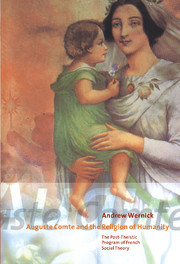Book contents
- Frontmatter
- Dedication
- Contents
- Acknowledgments
- 1 Introduction: rethinking Comte
- 2 The system and its logic (I): from positive philosophy to social science
- 3 The system and its logic (2): from sociology to the subjective synthesis
- 4 Religion and the crisis of industrialism
- 5 Love and the social body
- 6 The path to perfection
- Humanity as ‘le vrai Grand-Être’
- 8 Socio-theology after Comte
- References
- Index
Humanity as ‘le vrai Grand-Être’
Published online by Cambridge University Press: 05 July 2014
- Frontmatter
- Dedication
- Contents
- Acknowledgments
- 1 Introduction: rethinking Comte
- 2 The system and its logic (I): from positive philosophy to social science
- 3 The system and its logic (2): from sociology to the subjective synthesis
- 4 Religion and the crisis of industrialism
- 5 Love and the social body
- 6 The path to perfection
- Humanity as ‘le vrai Grand-Être’
- 8 Socio-theology after Comte
- References
- Index
Summary
Comte's trinitarian formula for the Positivist godhead discloses the same general tension as appears throughout his system. A this-worldly, and antimetaphysical, demythologisation of the kind attempted more maximally by Nietzsche coexists with a remythologisation designed to buttress a new, and this time unassailable, foundation for reestablishing subjective unity in the face of the anarchy he feared was terminal. What resolves the tension is that the latter consideration is always given the upper hand. The ‘sufficient incorporation of fetishism into positivism’ (XI:7) leads neither to perspectivalism, nor to an unsettling infinitude, nor to a real plurality of gods. It produces a hierarchy in which La Terre and l'Espace, in their guise, respectively, of Grand Fétiche and Grand Milieu, are completely dependent for their religious meaning on the Grand-Être they make possible and whose worship heads the list. If they are themselves to be regarded as sacred, it is only as a projective extension of l'Humanité or, more precisely, of the ‘universal sympathy’ engendered in and through us as its constituent agents and organs. The viability of the whole construct continues to hinge, then, on the move which in some sense made l'Humanité itself into a god.
What Comte sought – and thought he had found – was a god which, unlike the ‘fictive beings’ of the ‘theological stage’, would be intellectually in tune with the principles of positive science while still being able to play the authoritative and centring role for the individual and for society as a whole which ‘God’ had formerly played.
- Type
- Chapter
- Information
- Auguste Comte and the Religion of HumanityThe Post-theistic Program of French Social Theory, pp. 187 - 220Publisher: Cambridge University PressPrint publication year: 2001



